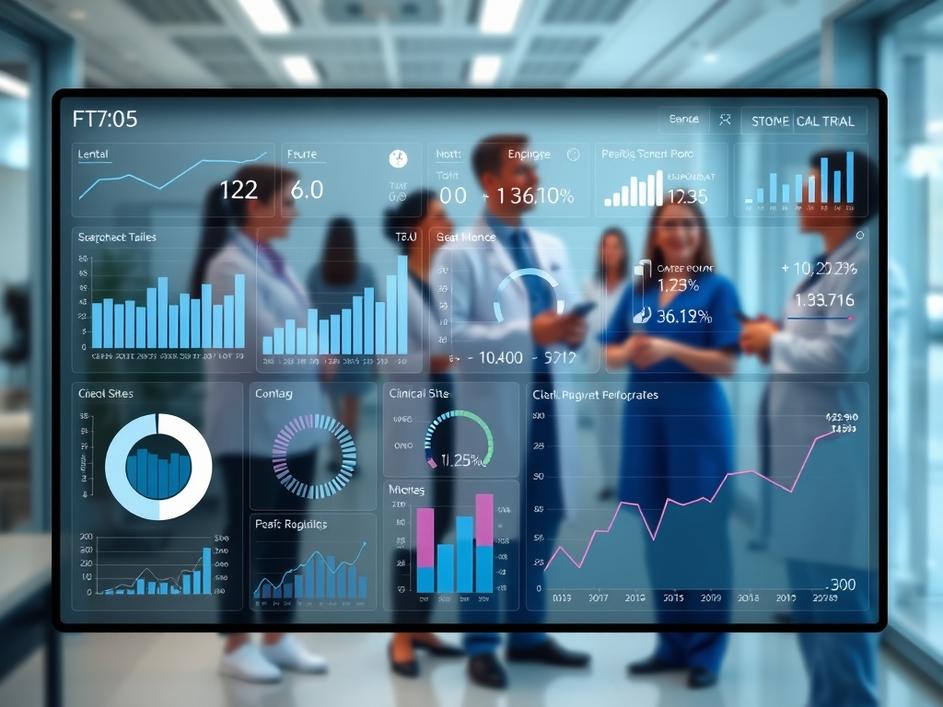


We are a digital agency helping businesses develop immersive, engaging, and user-focused web, app, and software solutions.
2310 Mira Vista Ave
Montrose, CA 91020
2500+ reviews based on client feedback

What's Included?
ToggleBehind every new medicine, every vaccine, and every therapy, there’s a clinical trial. These trials are the backbone of medical progress, but running them is incredibly complex. Imagine trying to manage dozens of separate research sites, each with its own staff, patients, data, and unique challenges. It’s a monumental task, often leading to delays, inefficiencies, and wasted resources. For a long time, much of this intricate work relied on manual tracking and a lot of guesswork. But something significant is changing in this quiet corner of healthcare. Companies are now finding smarter ways to handle all the moving parts, not just by looking at the science, but by making the process itself much better. This isn’t about flashy new drugs; it’s about making the entire journey of discovery more effective and reliable.
AMR Clinical, a major player in the world of clinical research sites, recently made a move that clearly shows where the industry is heading. They’re bringing in a new system called SiteGrades, developed by a company named Todata. You can think of SiteGrades like a very advanced, super-smart dashboard, but instead of showing you your car’s speed, it gives you a complete picture of how all your clinical trials are running. This isn’t just for one site; it’s designed to give AMR a clear, unified view across all their 30-plus research locations. Having this kind of overview helps them make better decisions every single day about where to put their efforts and resources. It’s a big step towards running things more smoothly and with far greater insight than ever before.
So, how exactly does this “smart dashboard” work its magic? SiteGrades pulls in a huge amount of information from every single one of AMR’s sites. This data includes everything from how fast patients are being recruited, to how different resources are being used, and how well each site is meeting important quality standards. Once collected, it then uses what’s called “compliant AI.” This simply means artificial intelligence that follows all the strict rules and privacy laws set for medical data. This AI isn’t there to replace human decision-making; its job is to sift through all that information and help the human teams see patterns and weak spots that would be almost impossible to spot otherwise. For example, it can quickly point out if one site is consistently struggling with patient recruitment compared to others, or if another site is spending too much time on certain tasks, hinting at a potential inefficiency. By doing this, AMR can catch problems early and figure out the best way to help each site succeed. It’s like having a super-smart assistant telling you exactly where to focus your attention for the biggest impact.
For AMR Clinical, adopting SiteGrades means several important improvements. First, they can make sure they’re using their staff, equipment, and other resources in the smartest way possible. In medical research, wasting time or money isn’t just bad for business; it can delay important discoveries. Second, this system helps them keep quality standards very high and consistent across all their many sites. When you’re dealing with people’s health, consistency and accuracy are vital. If every site can operate at a top level, it means the data collected is more reliable, which in turn helps scientists get clearer answers faster. And when trials run better, it directly translates to new treatments potentially getting approved and reaching patients quicker. It’s a behind-the-scenes operational change that has a very real, tangible impact on how fast we see new medical breakthroughs and get them into the hands of those who need them. It’s about bringing a new level of order and insight to what has always been a complex, sometimes chaotic, process.
This move by AMR Clinical isn’t just an isolated business decision; it’s actually part of a much broader, quiet shift happening across the entire clinical research industry. For many years, much of the work involved in trials relied on outdated methods – think manual tracking, endless spreadsheets, and sometimes, simply relying on institutional knowledge or best guesses. But as trials become more complex, span more countries, and demand even greater precision, those old ways simply aren’t enough anymore. We’re seeing more and more companies realize that if they want to stay competitive and, more importantly, bring new medicines to market efficiently and ethically, they need these kinds of smart, data-driven tools. It’s about being proactive and strategic, rather than always reacting to problems as they arise. This widespread embrace of technology means that the entire process of developing new drugs and therapies will become more streamlined, more accurate, and hopefully, less prone to costly delays. It’s a necessary evolution for an industry that literally holds the future of global health in its hands, and it’s genuinely exciting to watch this vital part of healthcare evolve.
It’s really important to remember that while we’re talking about AI and sophisticated data systems, these tools aren’t meant to take over people’s jobs. Instead, their true purpose is to help the real experts – the doctors, nurses, research coordinators, and site managers – do their already demanding jobs even better. Imagine having access to clearer, real-time information at your fingertips. This means you can spend less time trying to figure out what’s going wrong or sifting through mountains of paperwork, and more time focusing on what you do best: patient care, complex scientific questions, and ensuring trial integrity. That’s the real promise of this kind of technology. It’s about freeing up invaluable human intelligence and empathy to focus on the things only humans can do, while the smart systems handle the operational heavy lifting. There will always be a crucial need for human judgment and a compassionate touch in clinical research, especially when working directly with patients. But by giving staff better tools, companies like AMR are making sure their teams can deliver higher quality results, reduce stress, and perhaps even enjoy their important work more. This careful balance between advanced technology and the indispensable human element is absolutely key to making these systems truly successful in the long run.
What AMR Clinical is doing by implementing Todata’s SiteGrades might seem like a technical detail about operations, but it actually speaks to something much bigger and more profound. It’s about creating a clearer, more efficient, and more reliable path from scientific discovery to actual treatments that help people. By making the often-intricate and messy world of clinical trials more transparent and manageable, they are not just improving their own business. They are actively contributing to a future where medical breakthroughs can happen faster, with greater accuracy and reliability, and ultimately, reach the patients who need them most, sooner. It’s a quiet but powerful change that has the potential to reshape how we think about getting vital new medicines into the world, bringing hope to millions.



Comments are closed